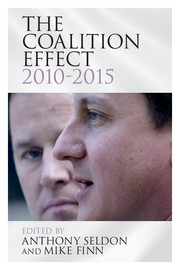Book contents
- Frontmatter
- Contents
- Contributors
- Acknowledgements
- David Cameron as Prime Minister, 2010–2015: The verdict of history
- Part I The coalition and the government of Britain
- Part II The coalition and policy
- Part III The coalition and political culture
- 17 The coalition and the Conservatives
- 18 The coalition and the Liberal Democrats
- 19 The coalition and the Labour Party
- 20 The coalition and the media
- 21 The coalition, elections and referendums
- Part IV Conclusion
- Index
19 - The coalition and the Labour Party
Published online by Cambridge University Press: 05 April 2015
- Frontmatter
- Contents
- Contributors
- Acknowledgements
- David Cameron as Prime Minister, 2010–2015: The verdict of history
- Part I The coalition and the government of Britain
- Part II The coalition and policy
- Part III The coalition and political culture
- 17 The coalition and the Conservatives
- 18 The coalition and the Liberal Democrats
- 19 The coalition and the Labour Party
- 20 The coalition and the media
- 21 The coalition, elections and referendums
- Part IV Conclusion
- Index
Summary
Introduction
Ed Miliband believed that the global financial crash provided an opportunity for a ‘progressive moment’ in British politics, to rival the generational shifts that took place in 1906, 1945 and 1979. The crisis and the deep recession it precipitated, he argued, undermined the core economic orthodoxy of the last thirty years that self-regulated market economies can be relied upon to deliver prosperity for the nation as a whole. His solution was a more ‘responsible capitalism’ – a rewiring of Britain's political economy with growth directed at boosting the living standards of the majority, not lining the pockets of a privileged elite. It was a highly ambitious agenda, both economically and politically, but one which, he believed, chimed with the times of twenty-first-century Britain.
Whether or not it actually did is open to debate. What is beyond doubt, however, is that during five years of opposition to a largely unpopular coalition government, Ed Miliband struggled to convince the British electorate that the Labour Party was the appropriate agent to bring about this far-reaching change. The double-digit lead Labour had over the Conservatives started to melt away in the final stages of the parliament, with most experts anticipating a very tight race and the almost guarantee of another hung parliament. Partly, this is because Labour did not do enough to persuade sufficient numbers of voters it was ready to govern again – in particular, the party was not trusted to run the economy. Moreover, Labour misjudged the public mood: anger over the financial crisis did not manifest itself in support for the conventional centre-left party but was instead channelled into rising support for populist parties – UKIP in England and the SNP in Scotland – who capitalized on the widespread sense of disaffection with the political mainstream at large. Consequently, it is far more likely that the government elected in 2015 will look and feel more like the fragile and ultimately politically weak Wilson/Callaghan governments of the 1970s, with the real prospect of Labour or the Conservatives ruling as a minority government, than the transformational premierships of Attlee and Thatcher.
- Type
- Chapter
- Information
- The Coalition Effect, 2010–2015 , pp. 520 - 552Publisher: Cambridge University PressPrint publication year: 2015



